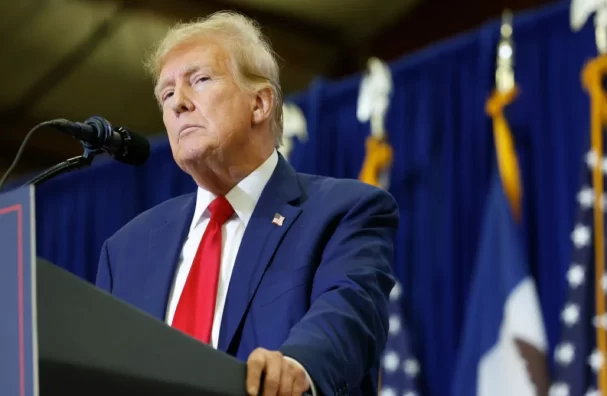
A pivotal case has ascended to the highest court in the United States, amplifying a debate about the protection from prosecution that a president can claim while in office. The case is based on the question of whether Donald Trump, the former president, possesses “absolute immunity” from criminal charges for certain actions taken during his presidency.
As the justices of the Supreme Court convened, Trump’s assertion of “absolute immunity” from criminal prosecution for acts performed in an official capacity came under intense scrutiny. This idea of absolute immunity is a contentious aspect of the case, as critics argue that it could potentially turn the presidency into a haven for criminal activity.
Despite their reservations about the concept of absolute immunity, the conservative justices, who make up the majority of the Supreme Court, voiced concerns about the potential vulnerability of presidents to vindictive prosecutions by succeeding administrations. They expressed apprehension about a cycle of retribution that could destabilize the democratic functioning of the country.
Trump, who is vying for a return to the White House, is appealing against lower court decisions that dismissed his requests for immunity from four election-related criminal charges. These charges stem from actions he allegedly undertook while serving as president, leading to an indictment by Special Counsel Jack Smith. The Supreme Court’s ruling could potentially reduce the severity of the allegations against Trump, but it is expected that parts of the indictment would endure.
In the face of Trump’s claim of absolute immunity, the justices grappled with the potential implications of such a measure. They considered a range of hypothetical scenarios, from the selling of nuclear secrets to a bribe or the orchestration of a coup or political assassination. The justices appeared reluctant to embrace the idea of complete immunity for official acts, but they acknowledged the need for some degree of protection, especially for less egregious actions.
Trump’s lawyer, D. John Sauer, argued that without presidential immunity from criminal prosecution, the presidency as we know it could be fundamentally altered. He pointed to the fact that no president has been prosecuted for official acts in over two centuries of American history. However, the court’s liberal justices were quick to challenge this argument, underscoring the potential dangers of such blanket immunity.
The conservative justices seemed inclined to remand the case to the lower courts for further analysis. They raised questions about which of Trump’s actions cited by the prosecution were taken in an official capacity versus a private one, and which of those actions might warrant some level of immunity. This could further delay Trump’s trial and complicate the legal proceedings.
Given the Supreme Court’s decision to postpone hearing arguments on immunity until this month, Trump’s trial, initially scheduled for March, has already been delayed. If Trump returns to the presidency, he could potentially attempt to end the prosecution or pardon himself for any federal crimes.
The indictment in August 2023 charged Trump with conspiring to defraud the United States, corruptly obstructing an official proceeding, and conspiring against the right of Americans to vote. Trump sought to have these charges dismissed based on his claim of immunity, but was ruled against by U.S. District Judge Tanya Chutkan in December. The U.S. Court of Appeals for the District of Columbia Circuit upheld this ruling in February.
The Supreme Court’s decision in this case could have far-reaching implications not only for Trump but also for future presidents. This case has brought the concept of presidential immunity to the forefront of public discourse, raising critical questions about the balance of power in a democratic system, the limitations of executive authority, and the accountability of elected officials.
As the Supreme Court deliberates, the public watches closely. The outcome of the case could influence public perception of the American legal system and the presidency, shaping debates on these topics for years to come.
